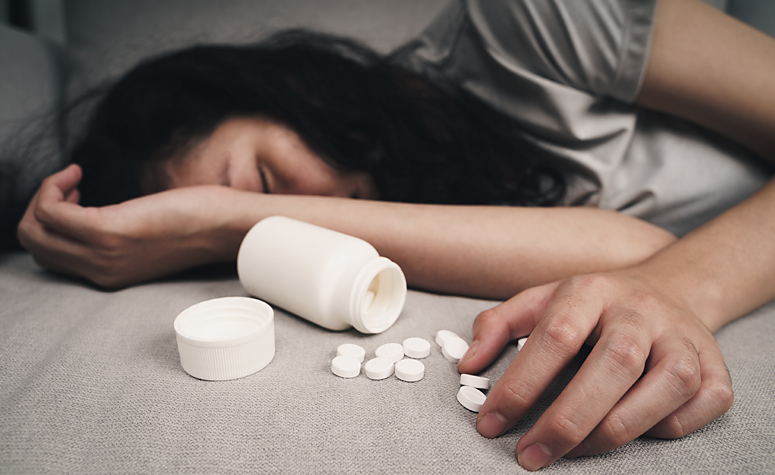Diazepam Addiction:
Signs, Symptoms and Treatment
Most people don’t know what Diazepam is, but many are familiar with its trade name Diazepam. This drug is so immensely popular that it has become practically synonymous with the term “tranquiliser”. It works highly effectively at reducing the symptoms of anxiety and relaxing the muscles.
However, Diazepam can be habit-forming. Individuals can easily develop a dependency and addiction to the drug, particularly if it is taken for an extended period or misused. This guide contains everything you need to know about Diazepam addiction – its effects, symptoms, and the different treatment methods available.

What is Diazepam?
Diazepam belongs to a class of medications called benzodiazepines which enhances the effect of the calming brain chemical gamma-aminobutyric acid (GABA) on the nervous system. It is a short-term medication prescribed to individuals suffering from anxiety, insomnia, muscle spasms, and seizures. The drug is also used to minimise symptoms of alcohol withdrawal.
Because of its highly effective calming and sedating properties, individuals can easily misuse or become addicted to Diazepam, taking more than directed or extending its prescribed duration of use.

What lies behind us and what lies before us are
tiny matters compared to what lies within us
What are the Effects of Diazepam?
Diazepam works effectively in reducing symptoms of anxiety, relaxing muscles, controlling seizures, and treating symptoms of alcohol withdrawal. However, there are serious health consequences that can result from misuse or long-term use.
Below are the positive and negative effects of Diazepam:
- Therapeutic effects
Reduced levels of anxiety, relaxed muscles, prevention of seizures, management of acute alcohol withdrawal symptoms. - Misuse effects
Euphoria, drowsiness, confusion, impaired memory and motor skills.
Individuals who chronically misuse Diazepam can become physically dependent on it, finding themselves unable to function without having it in their system. They can also develop tolerance, prompting them to increase the dosage for the drug to take effect.

Signs and Symptoms of Diazepam Addiction
Diazepam overdose can result in very serious consequences, sometimes even death. Early detection is crucial. If you suspect that you or a loved one may be addicted to the drug, watch out for the following symptoms:
More frequent intake in increasing doses
Daily life centres on obtaining, using, and recovering from Diazepam
Diazepam is top priority, with everything else (family, work, school) a far second
Diminished interest in social activities, hobbies, or interests
Continued use of Diazepam despite worsening health problems
Engaging in risky behaviour resulting from Diazepam use
Experiencing withdrawal symptoms when trying to reduce or stop taking Diazepam
Physical symptoms
Abnormal breathing pattern
Aggression
Delirium
Dizziness
Falling down
Memory loss
Nervousness
Paranoia
Unable to focus
Behavioural symptoms
Stealing money or objects
Engaging in illegal activity
Being increasingly secretive
Becoming defensive when asked about drug use
Withdrawing from loved ones
Can You Overdose on Diazepam?
Like other addictive medications, Diazepam is safe to use provided doctor’s directions are followed. A fatal overdose on Diazepam alone is rare, but it still happens. However, death from Diazepam overdose may result when the drug is when mixed with other substances such as alcohol or other benzodiazepines such as Lunesta (Eszoliclone) or Ambien (Zolpidem) commonly referred to as “z-drugs”.
Symptoms of mild Diazepam overdose include:
Confusion
Drowsiness
Lethargy
Coma or death rarely results from Diazepam overdose alone. These mainly occur when the drug is used in combination with other substances. Using excessive amounts of Diazepam results in over sedation which can lead to any of the following:
Low blood pressure
Ataxia (a degenerative disease of the nervous system)
Low muscle tone
Diminished reflexes

What Causes Addiction to Diazepam – Who is at Risk?
There are several factors that increase the risk of developing Diazepam addiction and these include the following:
- Long-term use
Using Diazepam for an extended period, even under doctor’s directions, can cause an individual to develop a tolerance and physical dependence on the drug. - Misuse
Addiction may develop if an individual doesn’t use the drug as prescribed such as increasing the dosage or frequency of intake or using it without a prescription. - Pre-existing mental health conditions
Individuals suffering from mental health disorders such as anxiety, depression, or other mental health disorders may self-medicate using Diazepam, thereby increasing the possibility of becoming addicted to it. - Genetic and environmental factors
Those with family members or relatives who have had substance abuse problems as well as those who deal with environmental stress on a regular basis have a strong tendency to develop addiction.
Diazepam Withdrawal Symptoms
Withdrawing from Diazepam can be a very difficult process, especially if an individual has been misusing it. In this case, the symptoms may be severe and even life-threatening.
The common withdrawal symptoms include:
- Anxiety and agitation
Rebound anxiety is the initial symptoms under treatment but with increased intensity. - Physical symptoms
Shaking, sweating, headaches, nausea, muscle pain, and a heightened sensitivity to light and sound. - Sleep disturbances
Insomnia and nightmares. - Psychological symptoms
Panic attacks, mood swings, depression, seizures or hallucinations can occur in severe cases.
Withdrawal symptoms can be severe which is why stopping Diazepam without medical supervision is highly dangerous. It is extremely unwise to withdraw from the drug on your own, the only safe way is to do it under the guidance of a medical professional.

Fast Access to Residential Treatment
We are currently able to offer fast access to private inpatient treatment. Please call us today and speak to one of our expert advisors.
Call in confidence: 0800 0148 970
How is Diazepam Drug Addiction Treated?
Treating Diazepam addiction is exactly the same process as treating any kind of substance use disorder. The treatment process involves three crucial steps in order: detox, therapy, and aftercare.
Diazepam drug detox
Detoxifying from Diazepam involves tapering off the amount of dosage under the supervision of a medical professional. This process minimises withdrawal symptoms such as insomnia and anxiety, making withdrawal easier to endure. Alternative medications are sometimes given to lessen the discomfort and support recovery.
Therapeutic approaches for Diazepam addiction
After the physical symptoms are addressed, treatment of the psychological aspects of Diazepam addiction comes next. The common therapies used include the following:
- Cognitive behavioural therapy (CBT)
Often, individuals develop an addiction due to their unhealthy thought patterns, negative ideas, and maladaptive behaviours. Through CBT, addicted individuals can identify these unhelpful elements and change them with positive ones. Therapists also work with individuals in developing helpful coping strategies to manage anxiety without the use of drugs.
- Motivational interviewing
This form of therapy is designed to guide individuals who are ambivalent about quitting towards wanting positive change.
- Group therapy and support groups
Going through the recovery process with others in similar situations increases an individual’s resolve to overcome addiction. The sense of belonging decreases feelings of isolation. Mutual aid and support are available in group settings, giving an individual a sense of purpose and responsibility.
- Holistic therapies
Long-term recovery includes incorporating stress management activities such as mindfulness, meditation and yoga into one’s daily schedule. Regular physical exercise is also necessary to boost overall health.
Diazepam addiction aftercare and relapse prevention
Regular attendance in therapy sessions helps individuals deal with residual issues and reinforces helpful coping strategies developed during rehabilitation.
- Continued therapy
By attending regular therapy sessions, individuals receive assistance and continued support in dealing with their ongoing life issues. This also helps reinforce their positive coping strategies.
- Support networks
Support groups and counselling are a source of continued emotional support. Participation requires being accountable, helping individuals make good decisions and be less likely to yield to impulsive ones.
- Lifestyle changes
Individuals are encouraged to eat healthy, exercise regularly, and practice helpful stress management techniques as these significantly support recovery and promote overall wellbeing.
- Relapse prevention strategies
Relapse prevention strengthens an individual’s ability to avoid relapse. Together with a therapist, an individual maps out a plan that he or she can use when faced with triggers or situations that can lead to relapse.

What lies behind us and what lies before us are
tiny matters compared to what lies within us
In-Patient vs. Out-Patient Rehab Treatment Options
There are two treatment settings available depending on the severity of the case as well as the specific needs of the individual. The two options are as follows:
In-patient rehab treatment
In-patient treatment involves staying in a rehab facility or hospital on a residential basis. The round-the-clock care includes detox, therapy, and relapse prevention planning. This is for individuals with severe addiction as well as those with home environments that are not ideal for recovery.
Out-patient rehab treatment
Out-patient programs is a flexible treatment arrangement in which individuals are allowed to live at home but are required to regularly attend scheduled therapy sessions. This treatment set-up is ideal for individuals who live in supportive homes. Additionally, those who have completed in-patient care will find out-patient care a good way to progress from one stage of their recovery to the next.
The benefits of in-patient rehab for Percocet addiction
The structured and supportive environment of rehabilitation centres is highly beneficial for individuals recovering from Diazepam addiction. The advantages of Diazepam addiction recovery offered by rehabilitation centres include the following:
- Structured environment
The safe and controlled environment allows individuals to focus on their recovery. In such centres, triggers and distractions are minimised.
- Comprehensive care
Programs offered in rehab centres use a holistic approach, integrating medical detox, psychological therapy, and aftercare planning.
- Peer support
Interacting with others struggling with the same issues makes the recovery process less daunting. Individuals openly share their experiences without the fear of rejection or judgment. There is mutual aid and support which not only remove feelings of isolation but more importantly, motivate individuals to keep pushing on.
- Tailored treatment programs
Aside from the drug rehabilitation program, many rehab centres also offer specialised programs customised according to the needs of individuals, such dual diagnosis for individuals struggling with mental disorders along with drug addiction, and holistic therapies that help enhance overall wellbeing.

Your Next Steps
If you or a loved one is addicted to Diazepam, do not delay seeking professional help. Your initial step is to consult a healthcare provider or addiction specialist who will inform you about treatment options and develop a personalised recovery plan for you. Next is to join support groups where you can interact with others struggling with addiction just like you and receive guidance and support. It is also very helpful to educate yourself as much as you can about Diazepam addiction from informed sources.
Thousands of people have recovered from Diazepam addiction and you can be one of them. It’s just a matter of getting the right support and appropriate treatment. But of course, lasting recovery will never happen unless you take the first step towards that direction. The best time to get started on your recovery journey is now.
FREE Drug Addiction Assessment
If you or a loved one are struggling with drug addiction, we understand the challenges you’re facing and we’re here to offer compassionate help.
Our highly trained advisers are available to speak to you right away, simply call 0808 252 3379 today.
We can discuss your concerns in complete confidence, explore the options for treatment, and help you to understand what will work best for you.
We’ll also help you to book your free drug addiction assessment there and then, with appointments usually available within only a few days.
We understand that taking the first step can be the most difficult, but we’re here to support – with no pressure or judgement.
Professional and compassionate help is just a phone call or click away.




